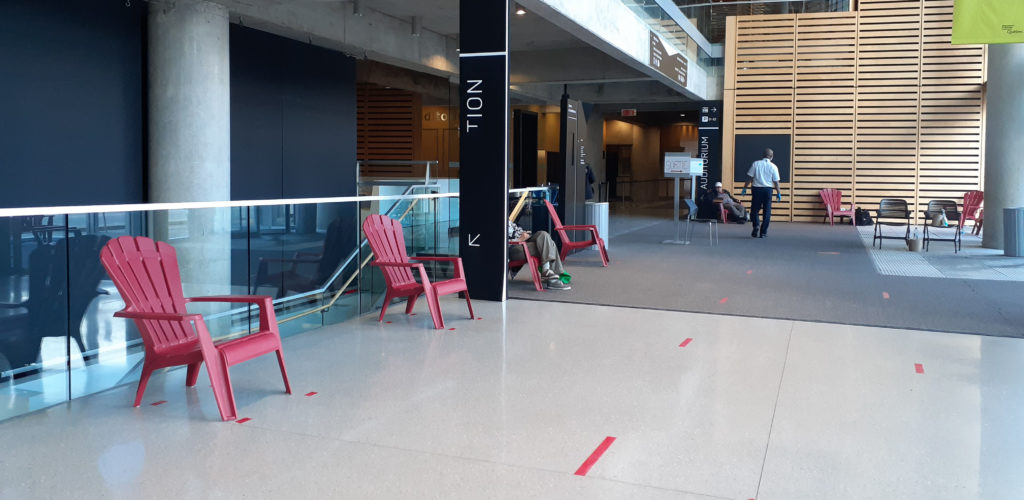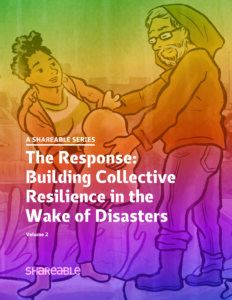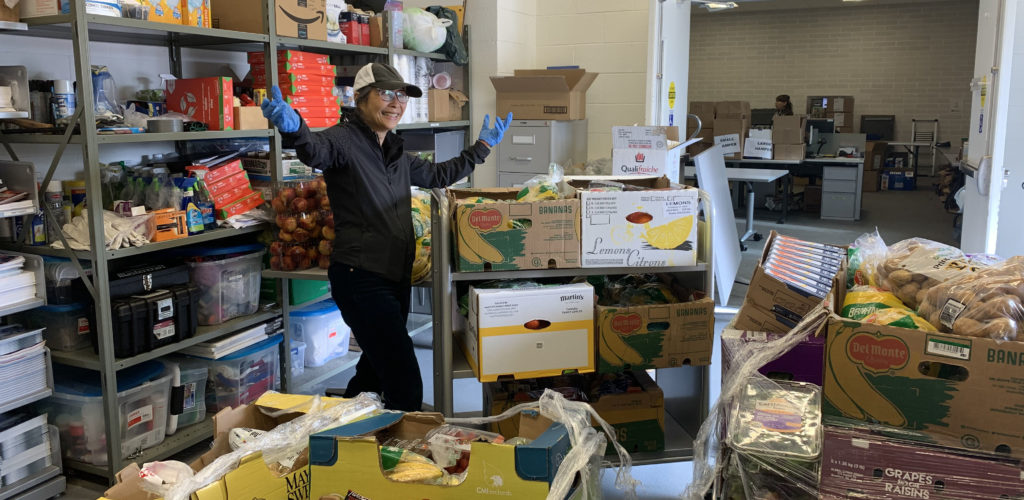It has been more than a month since the Toronto Public Library (TPL) network, the largest public library network in North America, closed its doors as part of the city’s efforts to control the coronavirus. There’s still no word on when the libraries may reopen, but librarians Courtney Cardozo and Gail MacFayden are already back at work, putting together food parcels. Nine TPL branches have been converted into food distribution centers in the past few weeks, in partnership with three local food banks.
More than 100 library staff volunteered to pitch in with the food distribution scheme. They packed their first hamper on March 25. “We’re working five days a week, putting together 500-600 hampers per day [at our main distribution center] and getting them set up to go out to the branches,” says MacFayden, a regional manager, in a rapid-fire interview before the day’s food distribution at the Albion Library gets underway.
Ryan Noble is the executive director of North York Harvest, one of the Toronto region’s largest food banks. He explains that as the COVID-19 pandemic hit, many smaller nonprofits which distributed food aid closed their offices, and volunteers at those organizations — mostly seniors — were concerned about leaving home. “Most of our food gets distributed through volunteer-driven agencies… and when schools and community centers closed, we lost another link in the distribution chain,” he says.
That’s where the libraries came in. “Food banks raised the [distribution] issue with the city council and the emergency operations office, and the idea of using the libraries came together very quickly,” says Noble.
Library staff deep-cleaned the TPL’s Ellesmere Sorting Facility and created a storage space and a hamper-assembly area. “They [library staff] sort, we transport,” says Noble. To minimize crowding, recipients call ahead to request a hamper and receive an appointment time or date, although people in need who drop by unexpectedly on distribution days are not turned away empty-handed. Distribution staff respect strict social distancing and wash their hands every 15 minutes to keep themselves and others safe. Hampers contain food that is “as accessible and culturally neutral as possible,” including canned goods, rice, beans, and usually some perishables like vegetables or yogurt, packed with love by local librarians. New children’s books are also included in hampers for families that request them.
“In general, libraries are great distribution points,” says Noble. “They’re safe, accessible, welcoming, dignified, and usually close to where people live. Lining up to use a food bank is a difficult experience; it’s a public admission that you need help. It’s hard for people, especially now, when we’re starting to see some people who have never used a food bank. We want to make sure people have a dignified experience.” He also points out that library staff have experience working with the public, including vulnerable people.
“We know how to move stuff, and we serve the public every day,” says MacFayden, the library manager. “We are a public service and we were so sad to see the library close, but this gives us purpose and a way to help.”
Montreal library provides safe space for city’s homeless

In normal times, thousands of people from all walks of life come to Montreal’s Grande Bibliothèque for a bit of peace and quiet, so it’s perhaps unsurprising that the front hall of the largest library in Quebec has been transformed into a daytime respite space for homeless people.
“We normally have several thousand visitors a day, and at least 200-300 are homeless people,” says Jean-Louis Roy, chief executive officer of Bibliothèque et archives nationales du Québec, the government agency which oversees the Grande Bibliothèque. “Like anyone else, they come to the library to use the computers, to look for work, to look things up and to rest. We’ve done some workshops with them over the years — they’re not strangers to us.”
Roy says the city initially asked library administrators to consider using the hall for food distribution, before deciding it would be better used as a day shelter. In three days, Roy says, the library and the city had addressed insurance and liability issues, deployed security guards and filled the space with 50 socially distanced lounge chairs. People can use the space to sleep, connect to Wi-Fi, use the washrooms or just enjoy the calm. City staff help users get in touch with their families or with health and social services providers if need be. Masked and gloved city employees dispense hand sanitizer. Most people stay for an hour or two. On a recent snowy Thursday afternoon, silence pervaded the space. “It’s a respite area with as many services as we can provide,” says Roy.
Roy and his team see the service as part of their basic civic duty. “There are thousands of homeless people in the city, and the malls and other libraries and all the places they normally go to get inside are closed,” he says. “We have a choice to either wall ourselves off from everyone or open things up and make life a little easier for people, and we choose the latter. Some doors have to open — in a coordinated way — but they have to open. We hope that we’ll set an example to show people that solidarity within the city exists even in a pandemic.”
Roy says the shelter hasn’t had any major difficulties so far, either with violence, cleanliness, social distancing or logistics. He says the city’s collaboration has been essential. “It’s a little like an orchestra that has to play from the same sheet music, everyone from the building maintenance staff to the communications people. We, the library, can’t do this alone and the city can’t do it without our space. It will be interesting to see what lessons we’ll learn after three or four weeks of this, but for now we’re just happy to see people’s faces once they’re in a space that’s safe and warm, with no one telling them to move along.”
##
This article is part of our reporting on The People’s COVID-19 Response. Here are a few articles from the series:
- Coronavirus catalyzes growing wave of grassroots action despite social distancing
- The coronavirus pandemic calls us to share more than ever
- The People’s COVID-19 Response needs you
- 10 ways to share during the COVID-19 pandemic
- The pandemic isn’t a portal, yet
- The Response: Resisting COVID-19 with mutual aid in Chico, CA
- 20 ways Shareable readers are helping during the pandemic
 |
Download our free ebook- The Response: Building Collective Resilience in the Wake of Disasters (2019) |









